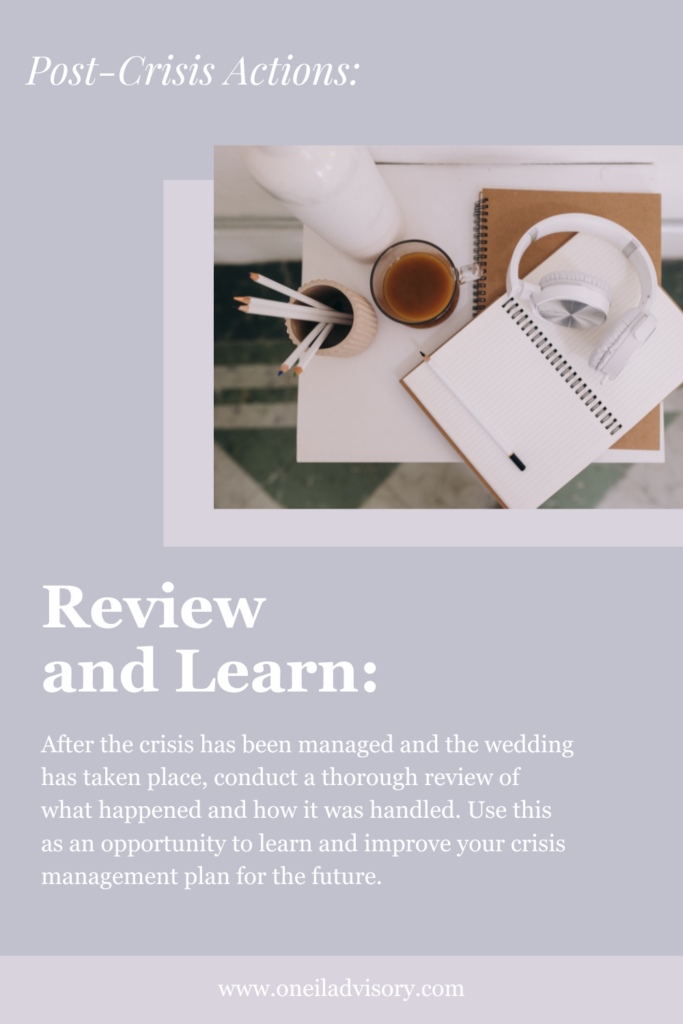
The world of wedding planning is filled with joy, love, and unforgettable moments, but it’s also susceptible to unexpected challenges and crises. As a wedding business professional, being prepared for emergencies is not only prudent but also essential for safeguarding your reputation and ensuring the happiness of your clients. In this blog post, we will explore crisis management strategies for wedding businesses, including contingency planning, effective communication strategies, and how to handle unexpected challenges with grace and professionalism.
The Importance of Crisis Management:
No one wants to think about things going wrong on their wedding day, but life is unpredictable, and emergencies can happen. Being prepared to handle crises demonstrates your commitment to your clients and your professionalism as a wedding business. It can mean the difference between a potential disaster and a seamless resolution.
Contingency Planning:
- Identify Potential Risks:
Start by identifying potential risks and challenges that could arise during the planning and execution of a wedding. These may include weather-related issues, vendor cancellations, or health emergencies like COVID-19. - Create a Contingency Plan:
Develop a comprehensive contingency plan that outlines steps to take in case of different emergencies. This plan should cover scenarios like venue changes, vendor replacements, and communication strategies with clients. - Build Relationships with Backup Vendors:
Establish relationships with backup vendors who can step in if a primary vendor is unable to fulfill their responsibilities. These backup vendors should be reliable and capable of delivering high-quality services.

Effective Communication Strategies:
Communication is paramount when dealing with crises in the wedding industry. Open, clear, and timely communication can help manage expectations and reduce stress for everyone involved.
- Client Communication:
Maintain transparent and empathetic communication with your clients. If an emergency arises, inform them as soon as possible and present them with potential solutions. Show understanding and a willingness to work together to navigate the situation. - Vendor Communication:
Establish a communication protocol with vendors to ensure everyone is on the same page in case of emergencies. Have a list of contacts readily available and be prepared to coordinate with them efficiently. - Guest Communication:
If the crisis affects guests, such as a weather-related change in venue, ensure that guests are promptly informed through various channels, such as a wedding website, email, or a designated point of contact.
Dealing with Unexpected Challenges:
Crisis management often involves thinking on your feet and making quick decisions. Here’s how to handle some common unexpected challenges:
- Weather-Related Issues:
If the weather takes an unexpected turn, have a backup plan for an indoor or covered location. Consider renting tents or umbrellas to keep guests comfortable. - Vendor Cancellations:
If a vendor cancels at the last minute, contact your backup vendor and confirm their availability. Share the change in plans with your clients and assure them that everything is under control. - Health Emergencies:
In the era of COVID-19, having a plan for health emergencies is crucial. This may include implementing safety measures, rescheduling the wedding, or offering virtual options for guests unable to attend in person.

Post-Crisis Actions:
- Review and Learn:
After the crisis has been managed and the wedding has taken place, conduct a thorough review of what happened and how it was handled. Use this as an opportunity to learn and improve your crisis management plan for the future. - Seek Feedback:
Ask your clients for feedback on how you handled the crisis. Their input can be invaluable in fine-tuning your approach to future challenges. - Adjust Policies and Contracts:
Based on the lessons learned, consider making adjustments to your contracts and policies to better address potential crises in the future. This may include specific clauses related to unforeseen events and refund policies.
In the world of wedding businesses, crises are not a matter of “if” but “when.” Being prepared and having a well-thought-out crisis management plan in place is the key to ensuring that even in the face of unexpected challenges, you can still deliver exceptional service, minimize stress for your clients, and protect your reputation as a trusted wedding professional. By identifying potential risks, fostering strong vendor relationships, and maintaining open and empathetic communication, you can navigate crises with grace and professionalism, ensuring that love prevails even in the most challenging circumstances.




